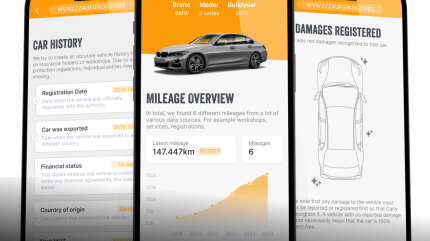
So, you want to purchase a new vehicle. You do the requisite research, make yourself a shortlist, and narrow the vehicles down before finding your perfect match. That’s the theory. However, some information on the vehicle may not have been presented, leaving buyers in the dark when it comes to previous MOT failures, damages or even theft.
UK-based, direct to consumer car diagnostics company, Carly, has recently launched its Car Check service, free of charge to customers.

Discover B2B Marketing That Performs
Combine business intelligence and editorial excellence to reach engaged professionals across 36 leading media platforms.
The check enables car buyers, as well as current owners, to access vehicle history reports using just the vehicle registration number. The Car Check enables users to determine critical information about a vehicle, including whether it has been written off, stolen, damaged, or tampered with in terms of mileage.
Frankie Youd spoke with Dan Meeghan, UK country manager, Carly, to discuss the service and to learn how Carly gains access to this information.

Just Auto (JA): What does the Carly Car Check allow users to do?
Dan Meeghan (DM): You simply put in the registration number. It will take all the data from MOT histories, so you can pull up what the mileage of the car has been over the years. You can see if there’s been any discrepancies in the vehicle’s mileage over the years of its ownership.
You can see all the previous MOT failures, etc and you can see if the car’s taxed; it will pull through if the car is still on finance. You’re able to avoid an issue of buying a car on finance because it is illegal to sell a vehicle that is still owned by a finance company.
You can also pick up if the car has had any accident damage, has been written off, or stolen that comes from the checks as well. On top of that, you can see if the mileage has been tampered with.
It will pick up if the vehicle has been through a salvage auction. If the car has been through a salvage auction, it may not have been written off with an insurance campaign. It’s highly likely that a car won’t show up as written off, but it may still have accident damage. If it’s been through salvage auction, we’ll also be able to pull through photos and damages.
Do customers need to subscribe to use this service?
No, you can just jump straight into it. We’ve included it as part of the primary app, the free version of the app, anybody can download. You don’t need a scanner; you can just simply download the app and register. It’s a ten second process, then you can get straight in.
It’s unlimited numbers of checks for anybody who wants to do them; it’s open to everybody.
The problem is as a consumer when you go to buy a car, you will look at four to five vehicles by the time you get into a shortlist. The problem is that four to five vehicles at £20 a scan each time, you’re into £100s before you’ve even gone to look at the cars.
It’s unlimited numbers of checks for anybody who wants to do them; it’s open to everybody.
Then if you find issues with those vehicles, you then go to cut out the ones with issues and then you’re going find another vehicle; all of a sudden you spent £200, £300 on a lot of data that is actually free to access. So 90% of the data we supply is completely free data. It doesn’t cost us any money to get it; it’s just in loads of different areas so we’ve done the groundwork and we’ve pulled it into one central source.
Where does Carly get this data from?
We’ve got API integrations with numerous data providers, from credit reference agencies, government websites, to police websites and police databases etc, all across Europe. A lot of these even use Interpol, you can pick up stolen vehicle data vehicles coming into the UK that have been stolen in Europe.
So, there’s a lot of data available that we can access and there are hundreds of data points that we pull into one central source. The nice thing is the registration number and the VIN number of the vehicle – they integrate everything together. It’s able to pull in lots of different reference points.
We have to go through numerous different stages with these companies to make sure that we are viable. We also have to jump through quite a few hoops for them to make sure they’re willing to give us the data in the first place.
How is Carly able to offer this service for free?
The data itself and the API’s cost next to nothing. The work that is involved in putting it together, the building of the app, the software, and the integration that we do, given the team that we’ve got, it doesn’t take us that long to build our system.
A little bit of an investment by us means that when these people come on board, we know that a percentage of anybody who’s going to use the checker is going to convert and will end up buying our other diagnostic products as well. So, for us, it’s a really good entry point into our business with consumers.
It allows people to learn who we are and what we do and understand why we do it. Hopefully, a small percentage of those will come along the bigger journey with us as well. At the end of the day, we can’t start educating people on how to maintain their cars until they’ve got the car in the first place. The best way to do that, and the easiest way to help people save money, is actually to help them buy a good car in the first place. Then hopefully they’ll come on that journey with us and we will help them to look after it through its lifecycle.
Due to increased popularity with the used car market, is there a problem with increased use of mileage blocking equipment?
Yes, the used car market in the UK is still growing at a rapid rate, and it always will be strong. What we’re seeing there now is if you look at the new car market, about 95% of new vehicles are sold on finance. The biggest percentage that finance is PCP finance now when you’re buying a car with a PCP finance agreement, the things that make a difference to your monthly payments are the deposit you put, the term in which you borrow over, the interest rate and the mileage that you’re going to cover.
If you look at any example from any finance agreement or finance advertisement, the average mileage that’s used by manufacturers is 6,000 miles per year. The average mileage for UK drivers is around 15,000. They’ll tempt you with a very low payments, and what will happen is a lot of people are attracted to a very low payment because they’re saying it’s going to be very low mileage, and then they go out and spend £300 on a mileage blocker to reduce that mileage down.
There are unscrupulous businesses offering to come to your house and fit these mileage blockers. What’s happening is that adding 10,000 miles a year onto a finance quote could make a difference of £50 to £70 a month to your payments. So £50 to £70 a month over 48 payments is quite a sizable chunk of money, in comparison with a £300 outlay on a mileage blocker. We think there is a growing issue of people are taking advantage of this hardware and hiding the true mileage of their vehicles.
What do you predict the future to hold for the used car space?
I think for the used car space, especially in Europe, the way it’s going now is it’s still going to grow. I think what’s going to happen is that we’re going to end up with a large number of used vehicles on the market, more than we have today because not everybody is going to convert to EV, e-fuels, etc.
We’re going to maintain more of our older vehicles on the road, so when we get to the point where we’re selling EVs brand new, there’s going to be a much bigger fleet of used vehicles in the UK that are still the internal combustion engine, vehicles hybrids, etc.
I think for the used car space, especially in Europe, the way it’s going now is it’s still going to grow.
EVs on top of that are still going to add to the fleet as well, then we’re going to have all the autonomous vehicles and everything else that’s going to go on over the next 15 to 20 years. We don’t really know 100% where it’s going to go, but what we can say is that there are probably going to be more vehicles on the road and a much bigger spread of vehicle types as well. So, a much more diverse vehicle fleet is going to be on the road.
Consumers are probably going to be more exposed to risks, the more vehicles that are available because of the various different avenues of change that can go on within the vehicle’s micro cycle.






